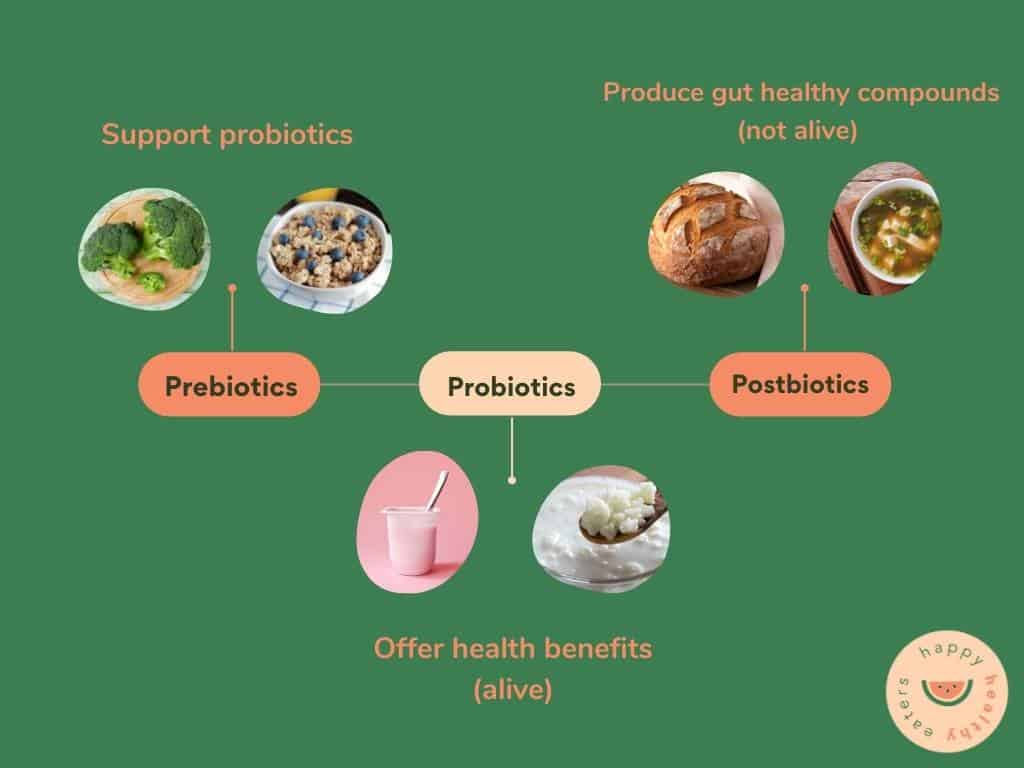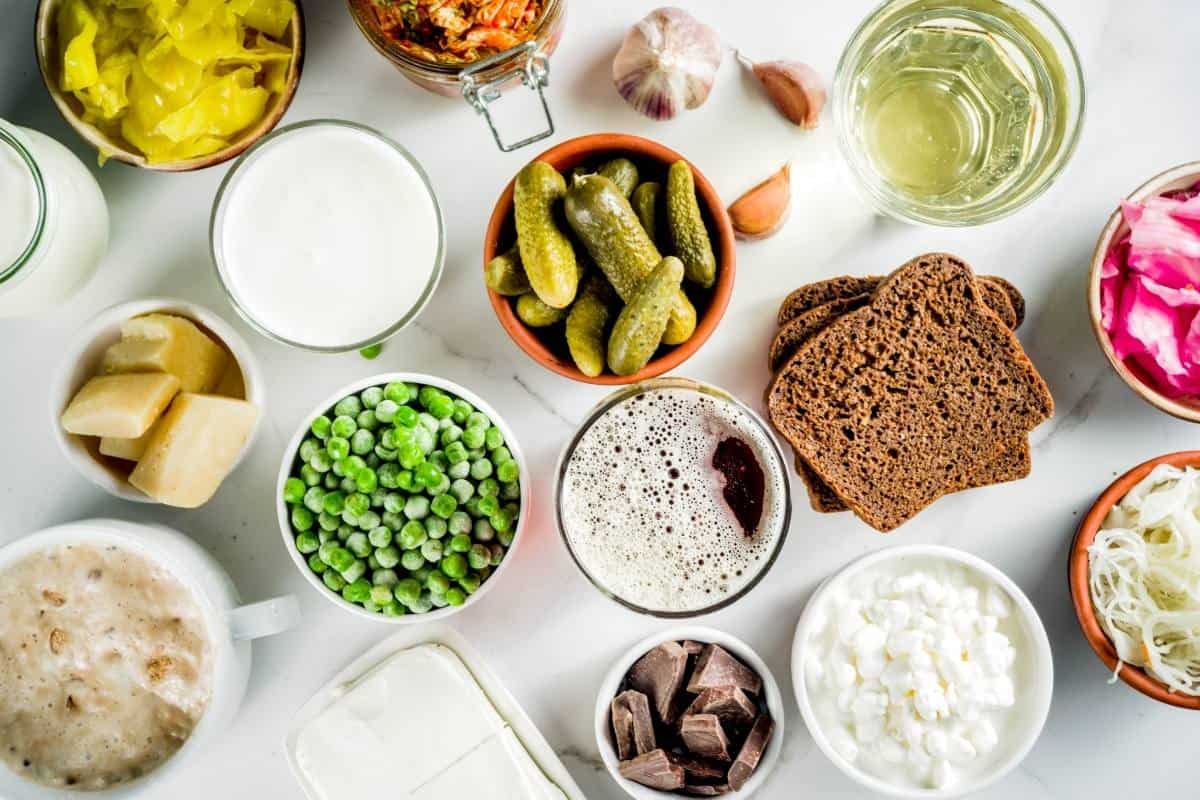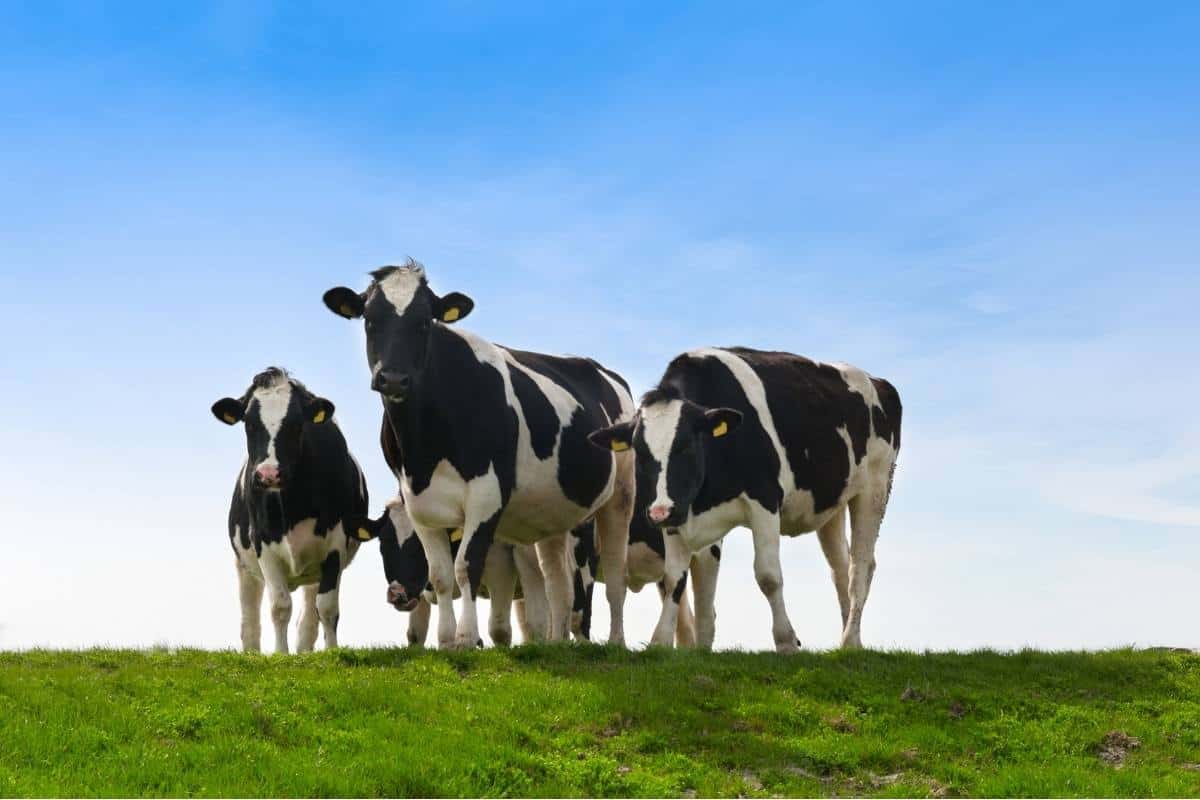It wasn’t all that long ago that the word ‘bacteria’ instantly conjured up images of tiny creepy crawlies roaming around with the goal of making us sick.
But now it’s more common to ask: “Is it good bacteria or bad?”
Or maybe you’re still thinking… “Wait? There’s good bacteria?!”
Scientific developments in the microscopic world have come a long way recently and yes, now we know that ‘good bacteria’ exists and have been given the term ‘probiotic.’
With all the buzz surrounding probiotics these days, you might be wondering “does my baby need a probiotic?”
As mamas, we’ve asked ourselves this question too! Lucky for us, we’re also Registered Dietitians and have been able to take a deep dive into the science of probiotics. Lucky for you, we’re spilling all we’ve learned in today’s article!
While there are bacteria living harmoniously with us humans all over us on our skin, in our mouth, etc., we are primarily focusing this article on the bacteria that live in our digestive tract and how that contributes to gut health.
Table of Contents
What are Probiotics?
Definition alert! Gut health involves a lot of scientific terms so we want to make sure we’re all on the same page when it comes to the words we’re using!
Before we get into whether your baby would benefit from taking a probiotic, let’s learn exactly what this term means!
Probiotics are formally defined as: live microorganisms which when administered in adequate amounts confer a health benefit on the host.
Did you read that and go “huh?” Yeah, the technical definition is a bit much.
How’s this?
Probiotics are bacteria and other tiny organisms that live in the body (at least for a little while) and offer a health benefit.
Probiotics vs Prebiotics vs Postbiotics
Pro, pre, post what’s the difference!? We’ve just learned that a probiotic is the food or supplement we consume that contains live microorganisms. Now let’s look at prebiotics.
Prebiotics
Prebiotics are food for the beneficial microorganisms in our gut, such as bacteria and yeast, and can be found in the foods we eat or as supplements! Prebiotics are found in the form of dietary fibres; the parts of plants that are not digested by the human body. This means that these non-digestible fibres will pass through your intestinal tract into the colon where the microorganisms will feed on it. Okay, we hope we didn’t lose you.
Basically, the “good” microorganisms eat prebiotics, for the sake of simplicity. And, that’s a good thing!
You want to feed what’s helping you and starve what isn’t. We like to think of a garden analogy. Prebiotics are like fertilizers that help veggies grow, but kill off the weeds.
Now you may be wondering, why or when would I use a prebiotic? Good question! Humans of all ages can benefit from prebiotics! But you don’t need to go out and buy a special supplement. Prebiotics are found in everyday foods.
For example over 200 different prebiotics have been identified in human milk. These are called human milk oligosaccharides and we have a whole article dedicated to their health benefits here. Some formula brands are also starting to add prebiotics into their formulations. You can look for ingredients such as GOS or bio-identical 2’FL.
There’s also a good chance that if you’ve eaten breakfast today, you’ve eaten prebiotics too. Fruits, veggies, whole grains, legumes, nuts, seeds, and pretty much any plant based food will contain fibre, many of which are considered prebiotics. Which means, it’s easy for a baby starting out on solids to consume prebiotics. Eating a variety of plant-based foods is strongly correlated with improved gut health, due to these prebiotics!
So the final answer is: your baby doesn’t need a prebiotic supplement! They just need to enjoy a wide variety of fibre rich foods when they start solids.
Postbiotics
Sometimes bacteria can be helpful, even if they’re no longer alive by the time we consume them. This doesn’t fit the definition of a probiotic, so scientists realized we needed to develop another category!
Postbiotics!
Postbiotics are a combo of microorganisms and their byproducts that are not alive but still provide a health benefit to the host. These postbiotics can positively affect the microorganisms in our digestive tract through helping healthy bacteria thrive!
For example, live microorganisms are used to make sourdough bread dough. Sourdough has certain benefits, such as producing a lower glycemic effect than conventional bread. But when the dough is baked, the microorganisms become inactive.

Establishment of Microbiota in Early Life
The gut microbiota refers to all the different microorganisms that live in our gastrointestinal tract. In fact, there are 10-100 trillion cells in our gastrointestinal tract!! This includes both the “good” and the “bad.”
The makeup of the microbiota has an impact on our health. For instance, a disruption in the balance of normal bacteria in our gut (called dysbiosis) can be associated with negative health outcomes. If dysbiosis occurs, the correct probiotic can sometimes be taken to help restore a healthy balance of microorganisms!
Lastly, let’s discuss diversity. Having many different types of beneficial microorganisms in our gut (microbiota) helps improve our health. Studies have found that the gut of healthy individuals contains several different species of microorganisms.
Did you know: your baby is born with their own unique gut microbiota! After birth, the microbiota of the infant is continuously evolving. New research suggests that the first three years of life are crucial to the early establishment of the gut microbiome. But, the development doesn’t stop there!
By age five, the gut microbiota is still detectable from the adult’s microbiota in diversity! In fact, the gut microbiome continues to develop throughout childhood into adolescence; how neat!
What Influences the Development of the Gut Microbiota?
The infant microbiota or gut is influenced by several factors. These include diet, mode of delivery, human milk or formula, and antibiotic use. Let’s break these down!
- Mode of Delivery
- Infants’gut microbiome is influenced by how they made their entrance into this world. If delivered vaginally, infants’ gut bacteria are influenced by the bacteria that is present in the maternal vagina. If delivered via cesarean then infants’ gut bacteria are influenced by bacteria from parental skin and oral cavity and are said to potentially have less diversity. These gut microbiome differences may disappear over time.
More significantly, these differences in gut bacteria via mode of delivery may be related to the occurrence of chronic diseases that appear in later life. But don’t worry, the research in this area is still underway and further examination is necessary to improve our understanding on this topic.
- Infants’gut microbiome is influenced by how they made their entrance into this world. If delivered vaginally, infants’ gut bacteria are influenced by the bacteria that is present in the maternal vagina. If delivered via cesarean then infants’ gut bacteria are influenced by bacteria from parental skin and oral cavity and are said to potentially have less diversity. These gut microbiome differences may disappear over time.
- Feeding Methods
- The underlying factor here is that infants will have different strains of bacteria in their gut depending on what they’re fed. Formula fed infants might have more diversity than human milk fed infants but on the other hand, human milk fed infants may receive the specific bacterial strains required to support infant health. We need more research to determine what the long term effects on these differences may be if there are any.
- Diet
- The type of food a baby eats is one of the most influential factors that alters the gut microbiota. This is when we get excited! 🙂 Changes in what a person eats can alter the types of intestinal microorganisms. During early life, the diversity in the infant’s gut is quite low; however, it increases as the child grows. In other words, the gut microbiome is rapidly changing as your baby transitions from a predominantly liquid to solid food diet!
- Antibiotics
- Some children may be exposed to antibiotics during their early years of life. While antibiotics are a lifesaving intervention, they can also have short-term and long-term effects on the development of the gut microbiome. In the short-term there may be a change in diversity of the gut bacteria. The long-term impact of prolonged antibiotic use may be increased risk of developing Inflammatory Bowel Disease, allergies, etc. This is not to alarm you or perpetuate fear mongering, but rather to inform you! It’s best to have a conversation with your Physician and Dietitian to determine if supplementing with probiotics during or after antibiotic use is appropriate for your baby. And rest assured, we hope physicians are prescribing antibiotics judiciously! Again, when used appropriately, antibiotics can be life saving!
Do Babies Need Probiotic Supplements?
So, the big question, and….a not so simple answer. Essentially, there have been several randomized controlled trials that have demonstrated probiotics are effective in preventing and treating common diseases such as diarrhea and allergy. However, it must be noted that little is known about whether probiotics can offer benefits to healthy and typically growing infants. So basically, no, not all babies need to take a probiotic supplement. But, some babies might benefit from the use of a probiotic. Again, the research in this area is fresh!
How Can Probiotics Help Infants?
- Diarrhea: Probiotics are helpful in the treatment of acute diarrhea. They do this by shortening the duration of the diarrhea!
- Allergies: Recent evidence indicates that exposure to beneficial bacteria in infancy may have a role in the prevention of allergy, specifically eczema. The key word here is MAY. The research is evolving, and more is needed for conclusive results.
- Colic: Babies cry, that is inevitable and healthy! But have you ever experienced unreasonable, inconsolable crying that is associated with irritability and gas? If so, your baby might be experiencing colic. Research indicates that modifications such as dysbiosis or abnormal gut microbiota and inflammation may be linked to colic.
- General health: No, there’s no research to show that giving your healthy, normally developing baby probiotics will improve their health status.
Where Can My Baby Get Probiotics?
- Human milk
- Human milk contains an array of bacteria and also contains a prebiotic (human milk oligosaccharides).
- Formula
- Certain types of formulas contain specific strains of probiotics. Often you can see on the label that it contributes to healthy gut flora.
- Supplements
- If your baby could benefit from one for colic, diarrhea, or allergy prevention, there are infant versions of probiotic supplements on the market for these specific situations (see the section on different strains of probiotics below for more on this!)
Different Strains of Probiotics
It is important to know that probiotics are strain specific. This means that there are several different strains (types) of probiotics. These strains are able to survive the digestion process and make it to your intestine (hence why they are called probiotics)! Different probiotic strains have different health effects. The World Gastroenterology Organisation (WGO) states that the optimal dose of probiotics depends on the strain and product. Therefore, if your baby is being advised to take probiotics, then the strain, dose and duration of use should be specified by the referring clinician.
Think of probiotics like dogs. From Chihuahuas to Great Danes, they’re all part of the same species but they look and behave very differently. Let’s say you need a dog to perform a specific task. You need a dog to retrieve your ducks when you go hunting. You go ahead and get a little toy Papillon but it turns out to be completely useless at retrieval. You need to get the right breed for the “job”. It’s the same with probiotics. If there’s a specific health benefit you want a probiotic to accomplish, look for one that has been shown in clinical studies to provide that benefit. Yes, others may work but they’re more of a gamble.
How Can I Support My Baby's Digestive Health?
There are plenty of other ways in which you can help your baby have a healthy gut!
Feed the good bacteria
- Remember the good bacteria thrive on fibre, the complex dietary carbohydrates found in plants! Feeding your baby fruits, vegetables, whole grains, nuts, and legumes will help her have a healthy gut.
Consume the bacteria
- You can feed your baby live active cultures. These can be found in certain yogurts (but make sure to choose a plain, unsweetened yogurt) and other fermented foods!
Serve fermented foods
- Consuming fermented foods helps your gut have healthy food-related microorganisms. Fermented foods produce many active compounds (postbiotics) that have benefits to us and can be a part of an overall healthy diet.
Some fermented foods to feed your baby are kefir, sauerkraut, kimchi, tempeh, and many more! Check out this list of fermented foods. Are any of your family favourites on the list? Do you have a cultural fermented food you love?
Gut health is a COMPLEX topic so don’t worry if you’re feeling overwhelmed! We did too when we first dove into this science. And if we are being honest, this article only scratches the surface. If you have any questions don’t hesitate to contact us and we can help you out to the best of our abilities!
If you’re also looking for a bit more information, a little while ago we hosted our friend and digestive health expert, Andrea Hardy, for a takeover. You can watch that here!
A huge shoutout to University of Manitoba human nutritional sciences practicum student, Caitlynn Danchuk, for her tremendous work in contributing her research and writing skills to this article!








2 thoughts on “Infant Probiotics + everything gut health for babies”
Thanks for all this information guys.
This is such an important topic & I always feel overwhelmed with all the information provided out there, but I must say you guys explained it so well by breaking it down.
My girls suffer from eczema since birth (8months old & 4 years old), can you please help me with what strain of probiotic coupd be helpful for eczema?
Thanks for your feedback! It was a difficult topic to try and break down and make it easier to digest (pun intended, lol). You can take a look here for the probiotics that have been shown to be helpful for childhood eczema.